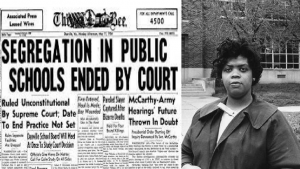Brown vs. Board of Education
Listen to the Recess! Clip
| Author | Shelley Fraser Mickle |
| Air Date | 5/17/2000 |

Brown vs. BOE Transcript
Today is the anniversary of the 1954 supreme court decision known as Brown v. the Board of Education of Topeka, Kansas. Generally, most people know that these words, Brown v. Education, are what led to the most startling social revolution in our country and to certainly the most moral decision that we as a people have been made to follow, if not always embrace. But when the words come down off the paper and get close to the earth, probably nothing has changed childhood in our country more than Brown v. Education. Because that’s what it was basically, a decision about how a childhood would be spent.
The words in the legal document go like this: “racial separation, no matter how equal the facilities, brand minority children as inferior, thus hindering their development.”
Hindering development – that’s the real bugaboo – the monster under the bed of childhood that all parents want to guard against.
In my life there is a certain irony about Brown v. Education. Because I spent my early school years in segregated Arkansas and yet my family moved to Lawrence, Kansas in 1954, the year of the court decision and only a short way from the place where it started. In my fourth grade class, there was one black girl. Her name was Loretta, and after all these years I not only remember her name but also where she sat: the last desk in the row next to the side blackboard. She was the black kid and I was the new kid. She was the biggest, and I was the smallest. There were two polio kids in the class, too. I was one of them. The other on was badly affected and could never leave his desk on his own steam. But I was normal in all ways except that I was outlawed from being the pitcher in kickball games at recess because I couldn’t run fast enough to get the bunts. More often than not, I was relegated to playing second base, and more often that not I was the captain because I was fast at being bossy. Loretta, when she asked to play, was always the last one chosen on a team and was assigned to the outfield, even though her physical attributes were clearly awesome. I can’t remember, either, that Loretta ever asked to play anything else.
What I remember about that fourth grade year and those kickball games is how often I realized that my physical difference was so much less of a hindrance than the color of Loretta’s skin. And how often, too, I thought about how lonely Loretta must be.
I hope today all of her children are captains of their teams.